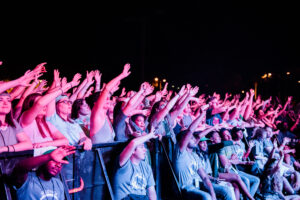Student engagement impacted by the pandemic

Compared to previous years, attendance at some on-campus events such as University Lecture Series (ULS) and Homecoming events has dropped, and according to Dean of Students Danielle McDonald, it could be associated with the lack of in-person events during the pandemic.
About 350 students saw comedian T-Murph’s performance this semester, compared to the 582 students who saw Michelle Buteau in the 2019 Comedy Show, the last one hosted in person before the pandemic.
Despite the drop, Joshua Wilson, associate director of the Center for Student Involvement (CSI), said he doesn’t think there has been a change in attendance at events CSI has hosted and he said students have been equally engaged.
“If you were to look at our numbers throughout the years, they’re always going to fluctuate based on the speaker, the person, the time of the year, what’s going on [and if it is] close to midterms,” Wilson said.
“We’ve actually seen pretty solid numbers compared to the past, but we have not yet fully processed all of our data for the fall semester regarding the events and in comparison.”
This semester’s only ULS with Julissa Calderon for Hispanic Heritage Month drew 30 people in the Marshall Student Center Ballroom on Oct. 15, which had a capacity for 500, while 50 people attended Lindsay Peoples Wagner’s ULS in spring 2020 in the Oval Theater. Calderon was paid $26,500 for the event.
In fall 2019, around 900 people showed up to see Josh Peck, with people lining up as early as five hours before the event. Wilson said CSI hoped more people would be at Calderon’s event, but CSI didn’t have much time to market the event because of the contracting process.
Attendance at events such as ULS is not representative of student engagement, according to McDonald. She said speakers are targeted toward specific student populations and don’t necessarily attract the whole student body.
“[Staff at CSI are] also looking at what are some speakers that just maybe resonate for a smaller population, but it’s a population that we need to be paying attention to or addressing,” McDonald said. “The students are looking at what are their priorities for that year, what are their topics that they want to have covered and then trying to meet those needs and having a diverse set of speakers for the series.”
The speaker who is chosen also depends on a survey where students vote on who they want to see speak as well as the department’s budget. In the fall semester, there was only one ULS because the speakers CSI was planning to bring didn’t fit the budget, according to Wilson, and it was hard to pull the event together within three weeks.
Lower attendance at events like the Comedy Show could be an effect of the online semesters and lack of in-person events, according to McDonald.
She said students who were new to campus might still be learning how to manage their time with classes and the on-campus activities. Although managing time can be a challenge for freshmen, McDonald said this year more students are facing it.
“I think that for [our new-to-campus students], they are also struggling with the challenge of learning how to balance [classes and activities],” McDonald said.
“When you were just taking online classes … you didn’t have a social life to balance. Some people weren’t working during that time, they didn’t have work to balance and they didn’t have all of these activities and organizations and extracurriculars to balance.”
Getting students to take on leadership roles in areas such as Student Government (SG), orientation and student organizations has been challenging, according to McDonald. She said the Senate didn’t have a quorum for at least two meetings because of open seats, and the recruiting process for orientation leaders and resident assistants has been lengthened.
“At least [for] one year, students have only seen orientation virtually, so they may not have really connected and known when an orientation leader does and so don’t know that it’s something they might be interested in doing in the future,” McDonald said.
“It’s the same thing with a lot of positions that we’re just needing to do a lot more educating on what those positions are, and making those connections so that people know that this might be something that they’re interested in.”
To address the challenges, McDonald said CSI has hired student engagement coaches, whom students can talk to about how they can get involved on campus. Those interested can sign up for a 30-minute consultation on BullsConnect.
For the spring semester, McDonald said she hopes students are settled with campus life and comfortable to engage in more activities. She said being engaged in college is more than just about having fun as it can help students develop skills outside of classes.
“One of the things that I often tell students is that your degree from USF makes you employable, but it’s what you do here that makes you promotable,” McDonald said. “[It is] those leadership, those involvement skills, those communication and teamwork skills that you get in these engagement opportunities that employers are really looking for.”







